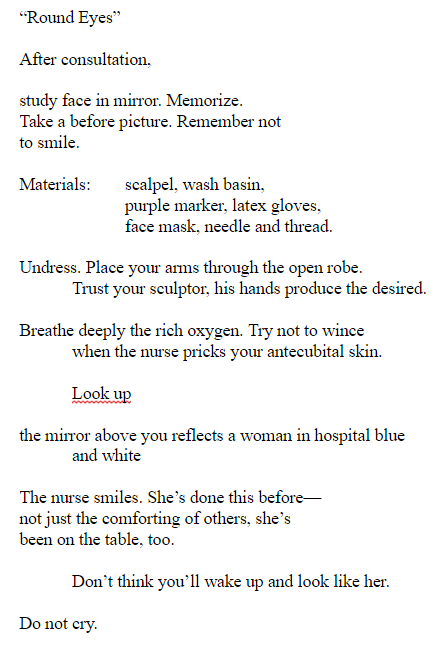This poem is in response to Janice Mirikitani’s “Round Eyes” poem and also inspired by something another MFA student said about girls in Korea. He said there was a specific face that Korean girls will try to achieve through plastic surgery and that these procedures are highly common, often given as graduation gifts or birthday presents.
I wanted to stick with the Asian ethnicity and provide a similar darkness to the poem as Mirikitani creates. Her poem reveals the desire to change, to be someone or something different than what you are, to blend in through this process of transformation one performs on herself. I wanted to mimic the process and stay with the eyes. Eyes are often how people tell how we feel, what we’re thinking. So much of ourselves is revealed through eyes and to want to change them has a transformative and simultaneously deceptive aspect to it.
Questions to Consider: Who is the speaker of Mirikitani’s poem? Who is the one she’s writing about? What about these two poems speak to one another in a way that’s reflective of racial identity?

Angela, I love your imitation of “Round Eyes” and the way you capture a kind of futuristic version of the idea that Mirkitami was addressing in er poem. The line, “remember not the smile” appeals to the kind facebook-post before-and-after shots we are all tired of seeing. I love too, the nurse character and the connection the speaker feels to her as someone who is selling the culture of reconstruction surgery on every level of her life, how in the nurse’s smile, your speaker sees her reflection in a sense. While it ends on a seemingly comfortable note–she’s in the hands of someone who gets it, gets her–any reader who questions the very idea of beauty will feel uncomfortable and maybe even sad as I did. Very nice working putting this trivial piece of information garnered in conversation to verse and making art of it!
I think that your question–who is the speaker–is a fascinating one given the focus on identity. We might think that the author of the original poem is reflecting on experience she knows intimately. Culturally, it is her experience. As an “outsider” enters to offer a version of the same poem, what’s at stake? Is this cultural appropriation? Or does it transcend race and ethnicity as it addresses the broader constraints of female beauty in any culture? Or beyond that, does it simply address, is this experience available to any reader who has felt such constraints?
I also like the way you reproduce what in the original poem can feel like a mirror (a self acting on the self) in the complex reflection that the poem’s speaker sees in the mirror. It underscores the extent to which questions of racial identity are always “reflective,” always a seeing of the self through eyes of an other and the pressures and constraints that that causes.